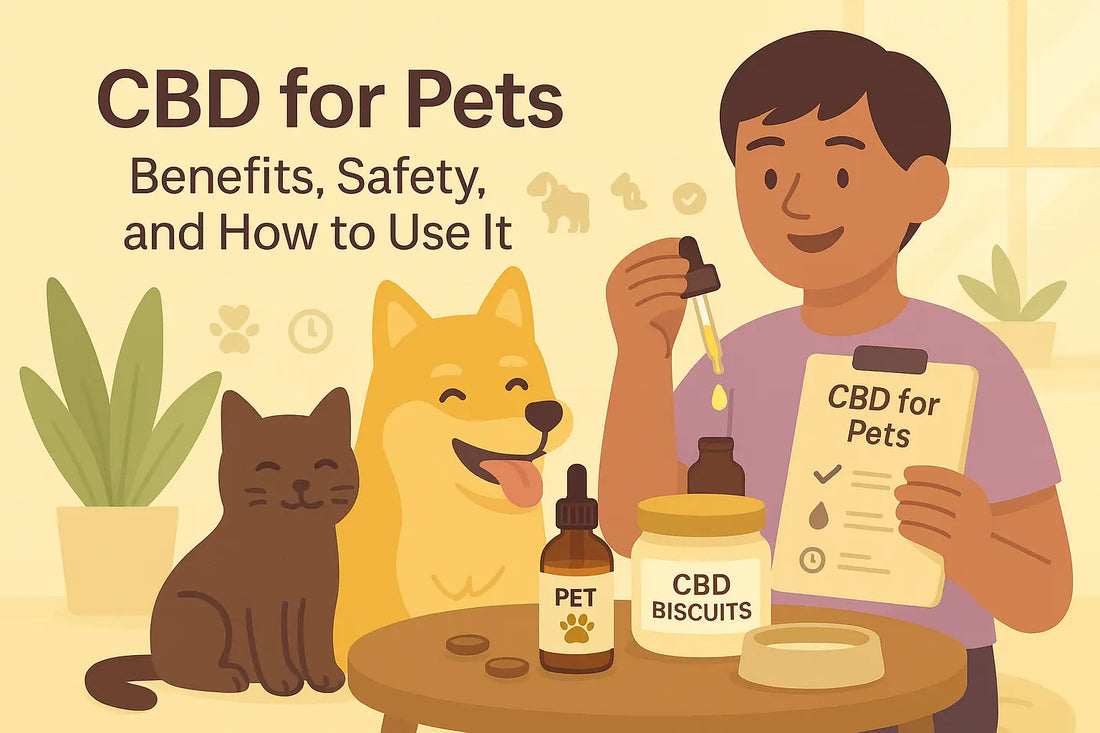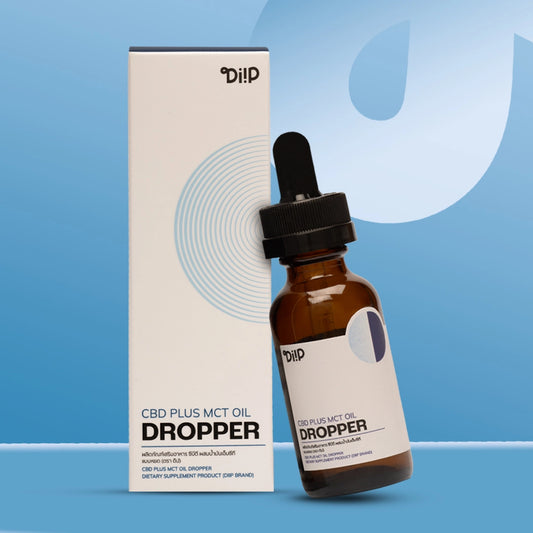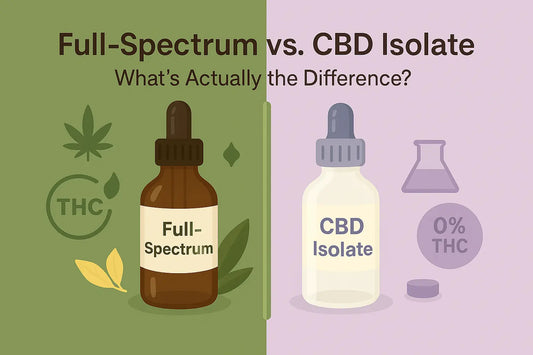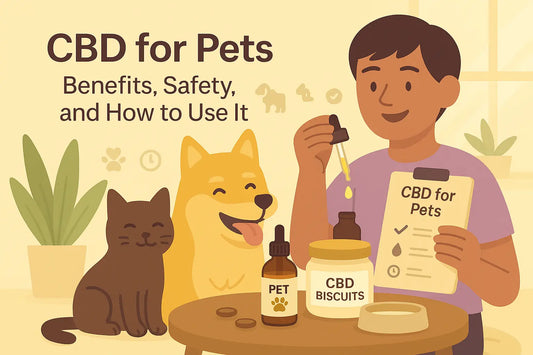
The Complete Guide to CBD for Pets: Benefits, Safety, and How to Use It
Cenk CetinShare
Introduction
For humans, CBD has come a long way and is becoming popular as a wellness remedy that shows up in every type of product possible, where we include it in routines from the morning to bedtime. Recently, researchers and scientists have started to talk among themselves and have come up with the big question: Could it give the same benefits for the pet?
The results come out promising, making more and more people turn to CBD to help their furry friends feel better. In this article, we’re going into the rabbit hole of CBD for pets, learning how it works, why a lot of people are interested in it, and what you should know before giving it to your pet.
Key Takeaways
- CBD is non-psychoactive and may help pets with anxiety, pain, inflammation, and more.
- Start with a low dose and adjust slowly based on your pet’s size and response.
- Some mild side effects, like drowsiness or dry mouth, can occur; consult your vet before starting.
What Is CBD and Is It Safe for Pets?
CBD, short for cannabidiol, is a natural compound that exists in many plants, including cannabis. This compound sets itself apart from its sibling, THC (the one that gets you high), by being the part of cannabis that is completely non-psychoactive. This means it won’t cause your pet to be stoned nor alter their personality. Instead, CBD is broadly praised for its calming and anti-inflammatory properties, and that’s what makes it such a hit in the wellness world.
So, is it safe for pets? Well, yes, when it’s given correctly. The research on how CBD can help animals is still in early stages and still growing; however, many early studies suggest that CBD may help your little (or not) friends with conditions like anxiety, pain, arthritis, and seizures in some cases, just like in humans. Therefore, not all CBD products are created to be the same. Unlike humans, pets can have different needs, and that’s why it’s important to choose special formulas made for animals. These products are calculated for the perfect dose, often flavored to appeal to pets, and free from harmful ingredients.
Potential Benefits of CBD for Pets
Similar to us humans, our furry companions can deal with several physical and emotional challenges, and CBD might offer a natural way to feel relief and balance. Here are some of the most talked-about benefits of CBD that may help your pets:
Anxiety & Stress Relief
Are your pets getting panicked during thunderstorms or having separation anxiety when you leave the house? CBD may help ease anxiety, noise sensitivity, and even promote a sense of calm without knocking your pet out.
Pain Management
For the unfortunate pets dealing with arthritis, pain from injury, or recovery from surgery, CBD can help relieve discomfort through its potential anti-inflammatory properties, which are especially helpful for managing chronic pain.
Support for Older Pets
Elderly furry companions often struggle with stiff joints and reduced mobility. With its potential benefits, CBD may help with joint functions and inflammation, helping these aging animals to feel more comfortable and making life easier for them.
Skin & Coat Health
By interacting with the endocannabinoid system, CBD can help alleviate your pets' symptoms of allergies and skin issues. Its anti-inflammatory and antioxidant properties offer relief from inflammation and itchiness, which leads to a pet with healthier skin and coat.
Digestive Support
Another important benefit of CBD when it interacts with the endocannabinoid system is to help maintain regular body functions, including digestion and immune function. By interacting with ECS receptors, CBD can offer gentle support to digestive wellness by promoting normal digestive balance.
Seizures
CBD offers neuroprotective effects in animal studies, which can help protect against brain and nervous system damage during seizures. It may also help reduce the frequency of the episodes, according to research published in the Journal of the American Veterinary Medical Association in 2019—which stated that 89% of dogs given CBD in the clinical trial had a reduction in frequency of seizures.
Fear-Based Reactivity
Further than easing anxiety, using CBD-based products can be a powerful and effective way to help reactive dogs manage aggression and fear-based behaviors through the same good old ECS system by promoting a sense of calm.
Cancer Treatment Support
CBD in pets, like humans, is believed to be safe with chemotherapy. A scientific review on canine cancer cells showed a synergistic effect between CBD and many chemo drugs, and it can also help pets relieve side effects caused by chemotherapy.
Liver Disease
If your four-legged friends are suffering from liver problems, CBD can help treat liver disease in the management of liver failure and alleviate liver symptoms. Veterinarians usually require high-quality CBD products that have been thoroughly tested for pets to achieve the most effective results. It can help control liver failure by reducing the inflammatory response, which causes damage to the liver.
Inflammatory Bowel Disease (IBD)
Cannabidiol works more like a subtle enhancer for the body’s natural functions and as a natural anti-inflammatory to boost the ECS functionality. It boasts several benefits for IBD, including:
- Maintain a healthy appetite
- Inflammation relief
- Stress relief
- Alleviate pain
- Support the immune system
- Promote healthy bowel movements
- Provide additional Nutrients
How to Give CBD to Your Pet
So, you’re ready to try CBD for your furry friend—but how do you actually give it to them without a battle at treat time? Luckily, there are a few easy and pet-approved options.
Common Formats
CBD for pets comes in several forms, so you can find what works best for your animal’s personality and preferences. They usually come in 6 main forms:
- Oils: Usually given with a dropper, you can place it directly in your pet’s mouth or mix it into their food.
- Treats: Created specifically for animal consumption, where CBD is combined with pet-friendly ingredients like oats and honey to cover the CBD’s natural bitter taste and make your pet think it’s just a tasty snack.
- Capsules: CBD extract is mixed with a carrier oil and gelatin to make CBD capsules for animals. Pet owners should manage to give this form of CBD to their pet directly into their mouth (throat).
- Creams (Topicals): CBD creams for pets are usually mixed with shea butter, beeswax, essential oils, or MCT oil. By applying directly to the skin, the product will be absorbed through the skin and into the tissues for fast relief.
- Patches: They work with the pet’s body heat to help release and activate the cannabinoids infused within the patches, terpenes, and essential oils, offering pain and inflammation relief.
- Powder: Refers to a finely crushed and pulverized pet supplement containing CBD that is also enriched with health-boosting ingredients and taste-enhancing flavors. CBD powder for pets can blend nicely with food and is very practical.
Tips for Giving CBD
Some pets are picky—no surprise there! If your pet isn’t a fan of the taste or texture, try mixing CBD oil into their food or a treat they love. Soft, wet food tends to mask the flavor best.
What’s the Right CBD Dosage for Your Furry Friend?
Every pet is different in shape, size, and weight. Therefore, calculating CBD dosage for your companion can be a bit of a math quiz for pet owners based on their body weight. It’s smart to start with a low dose, keep an eye on how they respond, then adjust it accordingly if needed. You can also make your life easier by using a CBD calculator. There are a few standard dosing tips to help you get started. A common rule of thumb is to begin with 1-2 mg of CBD for every 10 pounds of your pet’s weight. Here’s a breakdown based on size.
- Small Dogs (up to 20 lbs): 1-5 mg of CBD
- Medium Dogs (20-60 lbs): 5-15 mg of CBD
- Large Dogs (60-100 lbs): 15-30 mg of CBD
- Giant Dogs (over 100 lbs): 30-45 mg of CBD
Picking the Perfect CBD for Your Pet
For both humans and our four-legged family members, not all CBD products are created equal. Finding the right product that’s safe and effective for your pet’s needs is the number one goal. Here’s how you can do that:
Stick With Pet-Friendly Formulas
First things first: make sure the CBD product is pet-friendly. CBD products made for humans may include ingredients, such as xylitol or certain essential oils, that can be toxic to pets. Pet-specific options are designed with your furry friend’s body in mind, right down to the flavor.
Check for Third-Party Testing
Reputable brands provide lab test results from independent labs. These reports confirm that the product actually contains what it says—and nothing it shouldn’t (like heavy metals or pesticides). It’s your proof of quality and safety.
Know What’s in the Bottle
CBD labels can be confusing, but a quick breakdown helps:
- Full-spectrum includes all cannabinoids (including trace THC—still non-intoxicating for pets).
- Broad-spectrum contains many of the same beneficial compounds as full-spectrum, but without THC.
- Isolate is pure CBD and refined to remove all other cannabinoids, terpenes, flavonoids, and plant compounds.
Go With Brands You Can Trust
Look for CBD for pets brands with transparency towards their ingredients, sourcing, organic hemp, clear dosing instructions, including other factors like good customer reviews.
Possible Side Effects and When to Use the CBD
Even though CBD is usually safe for pets, it's crucial to monitor them closely when adding it to their routine for the first time.
Common (and Usually Mild) Side Effects
Some pets may experience:
- Drowsiness – The most common side effects of CBD in pets, especially at higher doses. Animals will feel a decrease in energy, sleepiness, and disinterest in everyday activities.
- Dry Mouth – CBD typically reduces saliva production in animals and causes dry mouth. Make sure the pet has access to fresh drinking water to help reduce thirst.
- Lowered Blood Pressure – CBD products for pets trigger an episode of temporary hypotension, which causes a decrease in blood pressure—often making your companion feel light-headedness and dizzy.
When to Hold Off on CBD
CBD isn’t for every pet—some pets are just plain allergic to CBD. You shouldn’t give CBD to a pregnant or nursing animal, or give it to an infant pet. If your pets are already taking other medications on a routine basis, it’s important to note that consulting with your veterinarian before giving them CBD should be done. This is due to the fact that CBDs tend to interact with one another, so make sure to play it safe before introducing CBD to your pet friends.
Bringing It All Together: A Healthier, Happier Pet
CBD is more than just a viral trend, it’s becoming a trusted supplement in pet wellness to help your pet friend with several health issues in a natural way to support their overall well-being. Choosing high-quality products made exclusively for pets with the right dose under the supervision of your veterinarian is a key step to combine CBD into your pet's routine while still keeping them safe. After all, they’re not just pets, they are family.








